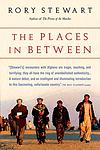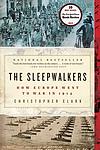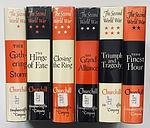The Greatest British "History, Fiction" Books of All Time
Click to learn how this list is calculated.
This list represents a comprehensive and trusted collection of the greatest books. Developed through a specialized algorithm, it brings together 301 'best of' book lists to form a definitive guide to the world's most acclaimed books. For those interested in how these books are chosen, additional details can be found on the rankings page.
Genres
The category of "History" in books refers to the study and interpretation of past events, societies, and cultures. It encompasses a wide range of topics, including political, social, economic, and cultural developments, as well as the lives of individuals and groups who have shaped the course of history. History books can be written from various perspectives and may focus on specific time periods, regions, or themes. They aim to provide readers with a deeper understanding of the past and its impact on the present.
Countries
Date Range
Reading Statistics
Click the button below to see how many of these books you've read!
Download
If you're interested in downloading this list as a CSV file for use in a spreadsheet application, you can easily do so by clicking the button below. Please note that to ensure a manageable file size and faster download, the CSV will include details for only the first 500 books.
Download-
1. 1066 And All That by W.C. Sellar
The book is a satirical take on the history of England, presenting a whimsical recounting of events from Roman times through to the end of World War I, focusing particularly on the year 1066, known for the Battle of Hastings. It parodies the way history is taught, with an emphasis on memorable events, rulers, and dates, often getting facts humorously wrong or presenting them with a comical twist. The work is characterized by its irreverent tone, wordplay, and deliberate inaccuracies, lampooning both historical figures and the supposed objectivity of historians, ultimately suggesting that what is remembered from history is often a muddle of 'what you can remember' and 'what you cannot help remembering'.
The 3085th Greatest Book of All Time -
2. The Convert by Elizabeth Robins
"The Convert" is a thought-provoking novel that delves into the early 20th-century women's suffrage movement in England. The story follows the transformation of its protagonist, a young and well-to-do woman who becomes deeply involved in the fight for women's right to vote. As she becomes more engaged with the suffragette cause, she faces various personal and societal challenges, including the disapproval of her family and the wider public. The novel explores themes of feminism, political activism, and the personal sacrifices made by women who dared to challenge the status quo of their time. Through its vivid portrayal of the suffrage movement, the book provides a nuanced look at the complexities of social change and the power of conviction.
The 3453rd Greatest Book of All Time -
3. The Places In Between by Rory Stewart
"The Places In Between" is a memoir by Rory Stewart about his journey on foot across Afghanistan in 2002, shortly after the fall of the Taliban. He travels from Herat to Kabul, encountering a variety of people and landscapes along the way. The book provides a unique insight into the culture and history of Afghanistan, as well as the challenges faced by the country in the aftermath of war. Stewart's writing is both lyrical and informative, making for a compelling read.
The 4775th Greatest Book of All Time -
4. Midnight In Chernobyl by Adam Higginbotham
"Midnight In Chernobyl" is a non-fiction book that tells the story of the 1986 Chernobyl nuclear disaster. The book provides a detailed account of the events leading up to the explosion, the immediate aftermath, and the long-term effects of the disaster. It also explores the political and social context of Soviet Ukraine at the time, and the impact that the disaster had on the country and the world. The book draws on interviews with survivors, officials, and experts, as well as archival documents and scientific research, to provide a comprehensive and compelling narrative of one of the worst nuclear accidents in history.
The 6069th Greatest Book of All Time -
5. A Journal Of The Plague Year by Daniel Defoe
This book provides a detailed account of one man's experiences during the year 1665, when the bubonic plague ravaged London. Written in the form of a journal, it blends fiction with historical fact, offering a vivid portrayal of the city's atmosphere as the disease took hold. The narrative captures the fear, confusion, and chaos of the time, as well as the various responses of the populace, from those who fled to those who stayed to face the epidemic. The author delves into the social and economic impacts of the plague, including the efforts of authorities to contain it, the plight of the poor, and the moral and religious interpretations of the calamity, providing a compelling and immersive glimpse into one of the darkest periods of London's history.
The 7160th Greatest Book of All Time -
6. Paradise Regained by John Milton
This epic poem is a sequel to a much longer work and focuses on the biblical story of Jesus Christ's temptation by Satan in the wilderness. Over the course of four books, the narrative explores the intellectual and spiritual battle between the Son of God and the devil, who attempts to seduce him with various arguments and worldly temptations. However, Jesus remains steadfast in his faith and virtue, ultimately reclaiming the paradise that was lost by Adam and Eve's fall from grace. The poem celebrates the themes of redemption, the triumph of good over evil, and the wisdom and strength gained through suffering and temptation.
The 7160th Greatest Book of All Time -
7. Through the Language Glass: Why the World Looks Different in Other Languages by Guy Deutscher
This book explores the link between language and perception, challenging the conventional belief that languages are only tools for describing reality and do not influence the way we perceive the world. The author delves into how different languages can shape the way their speakers understand and interact with their surroundings, arguing that linguistic differences can significantly impact cognition and perception. The book combines linguistic analysis, cultural history, and cognitive science to provide a fascinating examination of how our mother tongue can affect our cognitive processes, including color perception and spatial orientation.
The 7855th Greatest Book of All Time -
8. Claudius The God by Robert Graves
"Claudius The God" is a historical novel that follows the life of Emperor Claudius, who unexpectedly rises to power in ancient Rome. Written as an autobiography, the book provides a unique perspective on the inner workings of the Roman Empire and the challenges faced by Claudius as he navigates political intrigue, assassination attempts, and the complexities of ruling a vast empire. With a blend of fact and fiction, the novel offers a vivid portrayal of Claudius' reign and the tumultuous era in which he lived.
The 7955th Greatest Book of All Time -
9. The Sleepwalkers: How Europe Went To War In 1914 by Christopher Clark
"The Sleepwalkers" by Christopher Clark is a comprehensive account of the events leading up to World War I. The book argues that the war was not caused by any one nation or individual, but rather a combination of factors including nationalism, alliances, and miscommunication. Clark explores the complex political landscape of Europe in the early 20th century and the actions of key players such as Kaiser Wilhelm II and Archduke Franz Ferdinand. The book provides a detailed analysis of the events leading up to the war and challenges traditional narratives of blame and responsibility.
The 8343rd Greatest Book of All Time -
10. Their Finest Hour by Winston Churchill
"Their Finest Hour" is the second volume in a series of books that recount the historical events of World War II from the perspective of a key political leader. This volume focuses on the period of intense conflict in 1940, particularly detailing the Battle of Britain and the strategic decisions and leadership that were pivotal during this time. It provides an in-depth look at the challenges faced, the resilience of the British people, and the speeches that rallied a nation under siege, offering insights into military strategies and the personal resolve of the author during one of Britain's most daunting periods.
The 8709th Greatest Book of All Time -
11. The Destruction Of Lord Raglan by Christopher Hibbert
"The Destruction of Lord Raglan" presents a detailed account of the life and military career of Lord Raglan, the British commander during the Crimean War. The book delves into the complexities of his leadership and the strategic errors that led to the infamous Charge of the Light Brigade. It portrays Raglan as a sympathetic yet out-of-touch leader, whose outdated tactics and miscommunications contributed significantly to the disastrous outcomes of certain battles. The narrative not only explores the military aspects but also provides insights into the personal and political pressures Raglan faced, ultimately leading to his downfall and death during the campaign.
The 8709th Greatest Book of All Time
Reading Statistics
Click the button below to see how many of these books you've read!
Download
If you're interested in downloading this list as a CSV file for use in a spreadsheet application, you can easily do so by clicking the button below. Please note that to ensure a manageable file size and faster download, the CSV will include details for only the first 500 books.
Download









